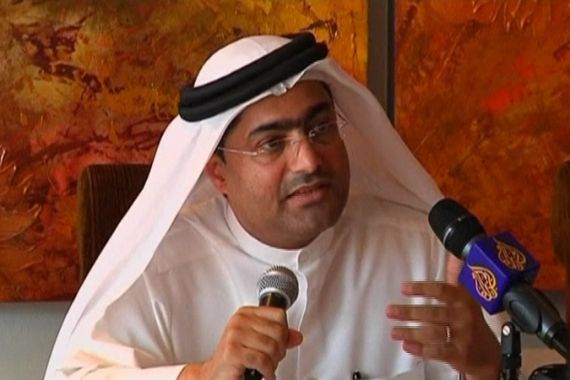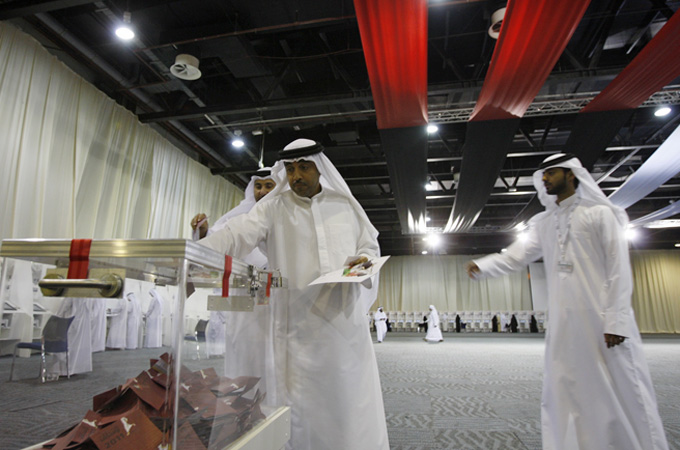Prison terms for UAE activists over ‘insult’
Five men sentenced to up to three years in jail for insulting leaders of the United Arab Emirates in online messages.

 |
| The UAE held its second election in its 40-year history in September, with 129,000 people eligible to vote [Reuters] |
Five political activists have been sentenced to between two and three years in jail for insulting the leaders of the United Arab Emirates.
The main defendant, Ahmed Mansoor, a communications engineer and poet, was accused of running a website that provided a platform for the rest of the defendants to express alleged anti-government views.
“The court pronounces publicly the following sentence: the accused Mansoor will be punished with imprisonment for
three years for the charges against him,” a Federal Supreme Court judge said on Sunday.
Mansoor was arrested in April along with economist Nasser bin Gaith, who lectures at the Abu Dhabi branch of the Sorbonne University, and activists Fahid Salim Dalk, Hassan Ali Khamis and Ahmed Abdul Khaleq.
The other four were sentenced to four years in prison. Because the case is being prosecuted under state security procedures, verdicts cannot be appealed.
The activists, four of whom are Emirati and one who is stateless, had been accused of calling for a boycott of September’s Federal National Council (FNC) elections and calling for anti-government demonstrations.
‘Unfair trial’
The defendants’ trial was criticised as “grossly unfair” by a coalition of seven rights watchdogs, including Amnesty International and Human Rights Watch (HRW), earlier this month.
|
Samer Muscati of Human Rights Watch discusses the activists’ sentences |
Samer Muscati, who has been monitoring the trial for HRW, described Sunday’s verdicts as “disappointing”.
“The trial has been unfair, so it’s no surprise that the verdicts are unfair as well,” he told Al Jazeera.
“They should never have been charged in the first place and the fact that they’ve been jailed for criticising government policy in messages online is absurd”.
Since November 13, the men have been on a hunger strike to protest against alleged violations of their rights by the judiciary, prosecution and prison officials.
Muscati said the men were taking liquids but refused food. He described their situation as “quite dire”, with one of the activists suffering from high blood pressure and another from liver problems.
‘Smear campaign’
The activists said in a statement earlier this month that they were the victims of a “smear campaign … characterised by lies, threats, and accusations of treason, and the pressure and mobilisation of public opinion to ensure our conviction for a crime that we have not been proven to have committed”.
The UAE, a federation of seven Gulf emirates led by oil-rich Abu Dhabi, has not seen any popular protests calling for reform like those that have swept other Arab countries, including Gulf states Bahrain and, to a limited extent, Oman.
But some activists have been openly campaigning online for a greater say in politics, more legislative power for the 40-member FNC and less censorship.
The FNC has no legislative powers and acts merely as an advisory board to the Federal Supreme Council, the country’s highest governing body, made up of the emirates’ rulers.
In September, the UAE held its second election in its 40-year history, with 129,000 people eligible to vote for the FNC. In the first such election, in 2006, only 7,000 people were eligible to vote.
Voters choose 20 of the 40 FNC seats and the rest are appointed by the country’s rulers.
The UAE’s population is estimated at about five million, of which less than 20 per cent are UAE nationals.